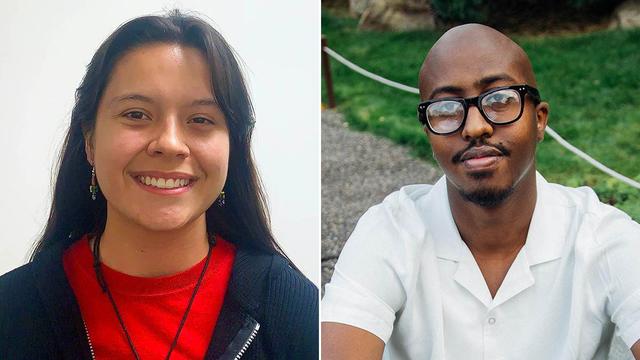A group of dedicated and talented college students successfully concluded a rigorous, entirely virtual Junior Summer Institute (JSI) training program last week, hosted by the Humphrey School of Public Affairs. They wound up their six-week session by presenting the results of their group research projects.
The JSI program is designed to prepare rising senior undergraduate students—mostly from underrepresented communities—to thrive in master’s degree programs and launch careers in public service.
This is the fifth year that the Humphrey School has hosted a JSI; as with last year, the program was entirely online due to ongoing COVID-19 precautions. JSI is offered through the Public Policy and International Affairs (PPIA) Program, a national nonprofit that supports a variety of efforts to increase diversity in graduate studies in public policy, international affairs, and public service.
To illustrate the program’s remarkable impact, two alumni shared their experiences in the Humphrey School’s JSI program.
Natalya Arevalo ’20 and Zakariya Abdullahi ’21 both earned their undergraduate degrees in political science at Augsburg University in Minneapolis. Abdullahi, who double-majored in international affairs, will attend the Humphrey School this fall in its Master of Development Practice program.
Both he and Arevalo already made their mark as emerging leaders at Augsburg.
Abdullahi served as the president of the Pan-Afrikan Student Union (PASU) and an editor for The Echo, Augsburg’s student newspaper. Arevalo served on the board for Augsburg Latin American Students (ALAS) and founded the student group Women for Political Change.
Their interest in social change and public policy made them perfect candidates for JSI.
“I had very close friends at Augsburg and Hamline who [went through JSI]. They told me I had to apply,” said Abdullahi. He did his own online research and, based on the graduate school skills the program promised, decided to apply.
Arevalo, on the other hand, received some information about the program from Augsburg’s Undergraduate Research and Graduate Opportunity (URGO) office. She met with the director of URGO to learn more, and was drawn to the research opportunity embedded in the program.
“I knew I’d be doing my senior thesis the year after, and that [JSI] would give me good skills to complete it,” Arevalo said.
Why the Humphrey School’s program?
The University of Minnesota is one of five institutions across the country to host a JSI. The others are Carnegie Mellon University; Princeton University; University of California, Berkeley; and the University of Michigan. Both Arevalo and Abdullahi chose the Humphrey School’s program because of its focus on community collaboration.
“I wanted to be directly tied to my community and to be able to make an impact at home. Community is important – if you don’t have that connection, you can’t build it,” Abdullahi said about his choice.
Arevalo’s sentiment was similar; the Humphrey School’s JSI program was the only one that mentioned social justice and community work, which made her choice clear.
A typical day
Arevalo attended JSI in person in 2019, while Abdullahi completed the program virtually in 2020. Although their programs had two very different formats, they completed the same amount of hard work and learning.
They describe it as “grad school bootcamp.” The intensive program begins with a weeklong orientation before coursework commences. JSI fellows are busy from 8 a.m. to 5 p.m., with two to three classes—such as policy analysis and statistics—during the day and cohort study sessions in the evening. They also conducted research projects focused on public policy issues that inspired them.
Additionally, various workshops and speakers are scheduled frequently, focusing on building career skills and strengthening relationships among the students.
A few of Abdullahi’s favorites from last summer were a speaker session about education in Africa and a House of Representatives simulation conducted by the students.
Takeaways
What makes JSI worth all that hard work? Arevalo and Abdullahi say the skills, opportunities, and networking it provides are invaluable.
“I took classes I never would’ve taken in undergrad. [They] made grad school feel doable,” said Abdullahi, adding that he honed his writing and research skills.
Networking is another important part of the program; fellows build deep relationships with their peers and are connected to an expansive network of alumni.
“I’m still in contact with some of my classmates,” said Arevalo. “Having conversations about careers with people of a similar mindset makes my network huge and inspiring.”
The biggest advantage of the program, however, is the significant financial support it gives its students to pay for graduate school. PPIA offers fee waivers for schools in their consortium, as well as substantial scholarships that can cover 50-100 percent of tuition.
Abdullahi is extremely grateful for this assistance, as he begins his master’s degree studies at the Humphrey School in just a few weeks. “Without PPIA, I wouldn’t be going to grad school,” he said.
Advice for prospective applicants
Arevalo and Abdullahi offer some advice to future applicants:
- Apply! “Just apply even if you think you can’t. I didn’t think I would get in and here I am,” said Abdullahi. “I would encourage especially Black kids to apply. When I went last year I was the only Black man [in the cohort] and that needs to change.”
- Use it as an opportunity to shape your future. “[Your future plans] do not have to be set in stone. PPIA is about identifying strengths and how to best use them. It doesn’t pigeonhole you,” Arevalo said.
- Take advantage of PPIA’s resources. “Don’t take it for granted. There’s more to it than a good resume item. Learn about other people, connect with professors, and learn the content,” said Abdullahi.
Find more information on the Humphrey School's website.
---
Adapted from a story originally published by Augsburg University Undergraduate Research and Graduate Opportunity (URGO)


